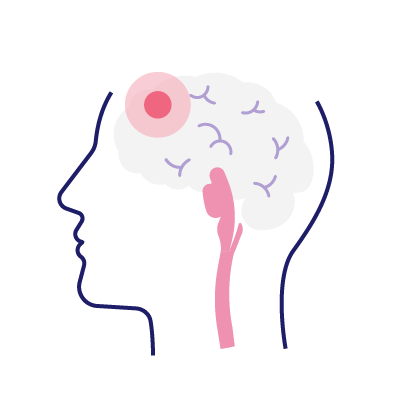
Glioblastoma
Glioblastoma, also referred to as GBM, is the most common type of malignant (cancerous) brain tumor. This fast-growing type of central nervous system tumor forms from glial (supportive) tissue of the brain and spinal cord. Glioblastoma usually occurs in adults and affects the brain more often than the spinal cord. Rarely, the cancer spreads outside the brain to other parts of the body.
Clinical trials
A ‘clinical trial’ is a research study in which a potential new treatment is investigated to prevent, cure or improve a disease or medical condition. A clinical trial also looks at how participants react to the potential new treatment and if any unwanted effects occur. This helps to determine if the new investigational treatment works, is safe, and is better than those that are already available. Many clinical trials also compare existing treatments or test new ways to use or combine with existing treatments.
All new drugs must be tested in clinical trials before they can be prescribed to patients. Without people taking part in these research studies, we would have no new drugs to help others with their condition.
Clinical trial of Debio 0123 in combination with temozolomide (TMZ) in patients with Glioblastoma
The Debio 0123-GBM-105 study is a multi-center study evaluating an experimental drug (Debio 0123) administered in combination with a common chemotherapeutic agent called temozolomide (TMZ) in patients with Glioblastoma (GBM) that have recurred or progressed to prior standard first line therapy. The study will also evaluate Debio 0123 in combination with TMZ and with radiotherapy in patients with newly diagnosed GBM.
The Debio 0123-GBM-105 study is divided into 3 parts.
Phase 1 – Dose Escalation
will evaluate Debio 0123 at different doses. The objective is to find out the highest and best tolerated dose of Debio 0123 when combined with TMZ, and with TMZ and radiotherapy. Phase 1 – Dose Escalation is composed of 2 arms: Arm A (patients with documented disease recurrence or progression) and Arm C (patients with newly diagnosed disease). Arm B has been discontinued.
Phase 1 – Dose Expansion
will evaluate the doses of Debio 0123 determined in the Dose Escalation phase (Arm A), with the objective of selecting the recommended dose to be assessed further in Phase 2.
Phase 2
will test how well the recommended dose works in combination with TMZ compared to other treatments currently available.
Inclusion criteria
- You should be willing to adhere to study plan and procedures and use effective contraceptive methods.
- You may be able to participate in Phase 1 – Dose Escalation (Arm A) if you have been diagnosed with either Grade 4 GBM or Grade 3 IDH-mutant astrocytoma (a type of brain tumor with a specific genetic change called a mutation) and your disease has been recurring or progressing after up to 2 prior treatment lines of which first-line was with TMZ-based chemoradiotherapy (TMZ concomitantly with radiotherapy).
- You may be able to participate in Phase 1 – Dose Escalation (Arm C) if you have a newly diagnosed Grade 4 GBM.
- You may be able to participate in Phase 1 – Dose Expansion or in Phase 2 if you have been diagnosed with Grade 4 GBM, and your disease has been recurring or progressing after first-line treatment with TMZ-based chemoradiotherapy (TMZ concomitantly with radiotherapy).
About Debio 0123
Cancer cells generally grow quickly and accumulate DNA damage over time. Too much DNA damage could cause the cells to die when they divide to form new cells. Therefore, many cancer cells take advantage of cell machinery, which allows time to repair this damage, so they can continue to multiply and survive.
The drug being investigated in this study, Debio 0123, prevents the cells from repairing their damaged DNA. As such, it is believed that it may help kill cancer cells and reduce tumor size.
-
Phases
When a potential new medication is being developed, it is first tested in a laboratory setting. If the results are positive, the drug may enter a clinical trial program. This means that it will be tested in humans in several ‘phases’ of study.
Phase I = Safety evaluation. The very first administration in humans, typically carried out in a small group of healthy volunteers to assess if the drug is safe.
Phase II = Efficacy evaluation. The first trials in patients with the intended disease to check if the drug works efficiently and if there are any unwanted side effects.
Phase III = Confirming findings. Trials in large numbers of patients that generally compare the drug to the best treatments available.
_Phases
- P
- Ⅰ
- Ⅱ
- Ⅲ
- M
Talk with your medical doctor
If you are interested in participating in an upcoming clinical trial (can be also referred to as a clinical study), ask your doctor if a clinical trial might be right for you. Your doctor knows both you and your health history, which is invaluable in making this decision. Your doctor can help you gather the information needed to locate a trial and help you identify what questions might be important to ask the clinical trial doctor before deciding to participate.
Find the trials on the map
This map relies on Google Maps, which could install cookies.
Please accept them in order to show the map.
Please share any related associations that may be useful